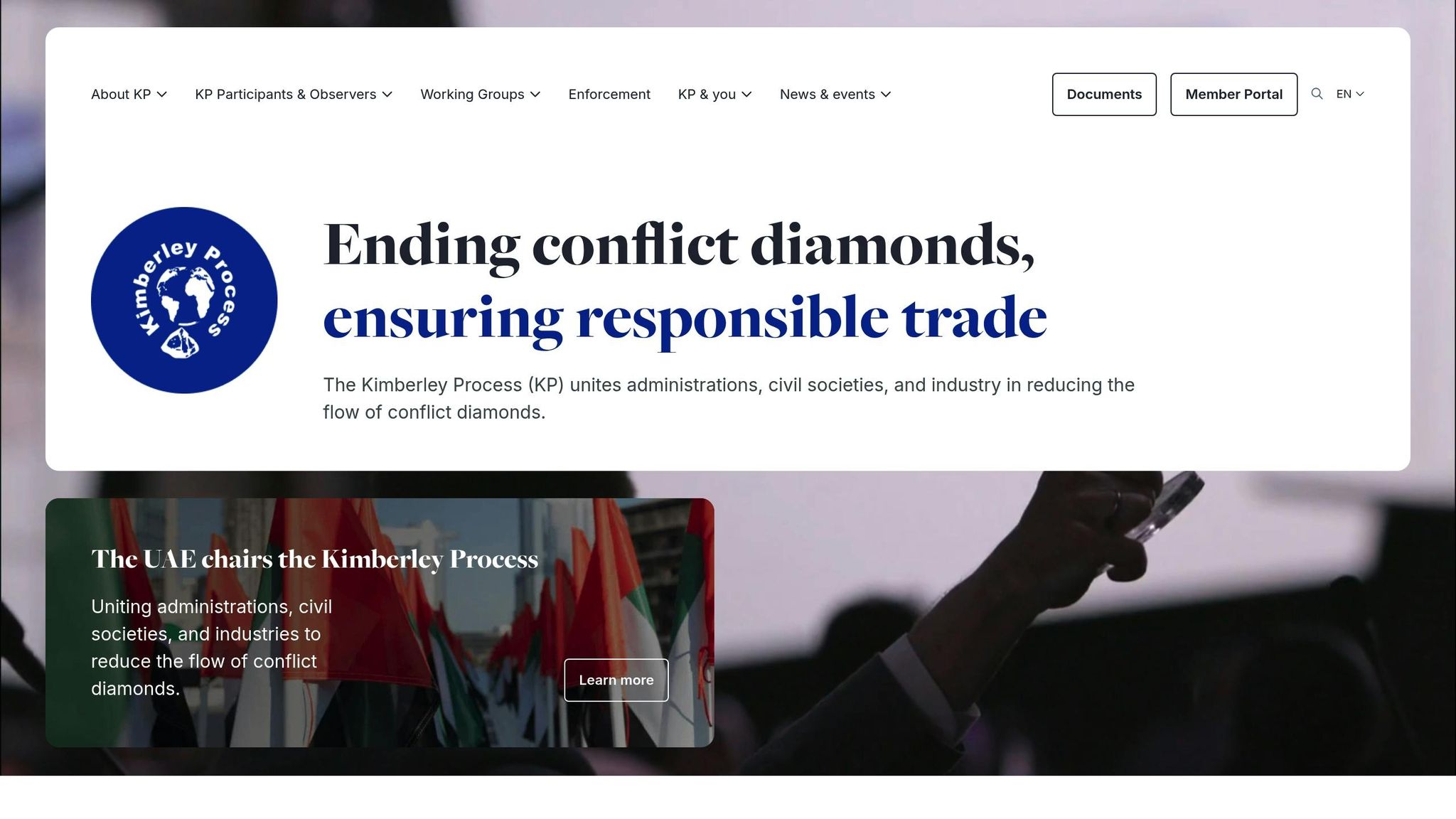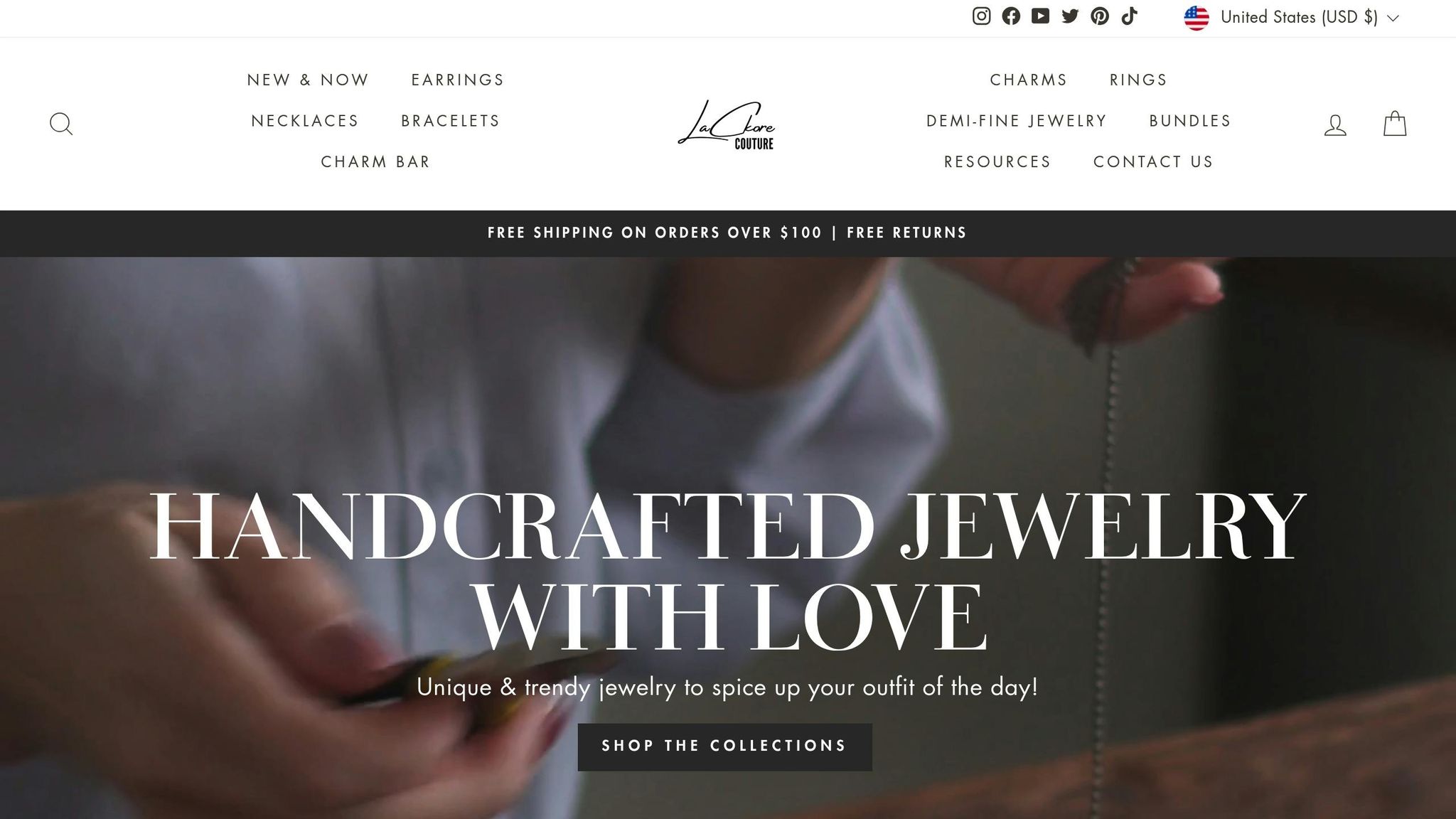Gemstones in Zodiac Jewelry: Ethical Sourcing Guide
When buying zodiac jewelry, understanding where gemstones come from is key to making responsible choices. Ethical sourcing ensures materials are obtained responsibly, protecting workers and the environment. Here's what you need to know:
- Worker Safety & Fair Wages: Ethical sourcing prioritizes safe conditions, fair pay, and bans child labor.
- Environmental Care: Sustainable mining reduces harm to ecosystems and restores land post-mining.
- Transparency: Traceable supply chains help confirm ethical practices.
- Certifications: Look for Kimberley Process (diamonds), Fairmined (metals), and Fair Trade Gems (colored stones).
- Lab-Grown Stones: A conflict-free, eco-friendly alternative.
Brands like LaCkore Couture focus on handmade zodiac jewelry using responsibly sourced materials, promoting fair labor and reducing waste. By choosing ethically sourced pieces, you support better practices in the jewelry industry.
Core Principles of Ethical Gemstone Sourcing
When it comes to choosing zodiac jewelry, understanding the principles of ethical gemstone sourcing can guide you toward more responsible decisions. These principles aim to protect both people and the planet, ensuring that every step of the gemstone supply chain reflects fairness, safety, and care. Let’s dive into the key areas that define ethical sourcing, from safeguarding workers' rights to preserving the environment and maintaining transparency.
Worker Protection and Fair Wages
The individuals involved in mining and processing gemstones deserve safe working conditions and fair pay for their efforts. Ethical sourcing prioritizes worker safety by ensuring access to protective gear, safe mining methods, and reasonable work hours.
Fair wages do more than just pay the bills - they help uplift entire communities. Workers and their families gain access to essentials like healthcare, education, and clean water. Many ethical operations also invest in local infrastructure, such as schools and medical clinics, to further benefit these communities.
Child labor is another critical issue in gemstone mining. Ethical sourcing bans the exploitation of children, implementing strict age verification processes and supporting education programs to keep kids in school rather than in mines.
Environmental Responsibility
Mining gemstones can take a toll on the environment, but responsible sourcing seeks to reduce this impact. Sustainable mining practices aim to prevent water contamination, protect local ecosystems, and rehabilitate mining sites once operations end.
Efforts to minimize environmental damage include using renewable energy, improving extraction efficiency, and restoring landscapes to their natural state. These practices help reduce the overall carbon footprint and ensure that mining activities don’t permanently scar the environment.
By combining eco-conscious initiatives with transparent supply chain practices, ethical sourcing ensures both ecological care and accountability.
Supply Chain Transparency
Transparency is about knowing exactly where a gemstone comes from and how it gets to the finished piece of jewelry. Traceable supply chains allow consumers to confirm that ethical standards were upheld every step of the way.
This level of accountability is achieved through detailed documentation, third-party audits, and advanced tools like blockchain technology, which provides tamper-proof tracking of a gemstone’s journey.
When you choose zodiac jewelry that adheres to these principles, you’re supporting a system that values human dignity and environmental care. It’s a choice that resonates far beyond your jewelry box, contributing to a more responsible and compassionate industry.
Certifications for Ethically Sourced Gemstones
Certifications play a crucial role in ensuring that gemstones meet strict ethical standards. They act as a transparent way to verify that zodiac jewelry is crafted responsibly. These third-party validations confirm that gemstones and precious metals are sourced in ways that protect workers, safeguard the environment, and avoid funding conflicts. Let’s dive into three important certifications that uphold ethical practices in gemstone sourcing.
Kimberley Process for Conflict-Free Diamonds

The Kimberley Process Certification Scheme (KPCS) is the global benchmark for preventing diamonds from funding armed conflicts. Established in 2003 under a UN-backed initiative, the process tracks rough diamonds from the mine to the market, ensuring they originate from conflict-free sources. This system has garnered widespread international support and has significantly reduced the trade of conflict diamonds.
Under the Kimberley Process, rough diamonds must be transported in tamper-proof containers and accompanied by a certification that guarantees their conflict-free status.
"The diamonds herein invoiced have been purchased from legitimate sources not involved in funding conflict and in compliance with United Nations resolutions. The seller hereby guarantees that these diamonds are conflict free, based on personal knowledge and/or written guarantees provided by the supplier of these diamonds." – World Diamond Council System of Warranties
To maintain these standards, the process involves regular monitoring and strict compliance measures.
Fairmined Certification

Fairmined Certification focuses on precious metals like gold, silver, and platinum sourced from artisanal and small-scale mining organizations. Created by the Alliance for Responsible Mining, this certification involves thorough assessments of labor conditions, environmental practices, and traceability. Mining organizations must legally own their mining areas and undergo detailed audits conducted by independent inspectors from IMOcert and NaturaCert.
One standout feature of Fairmined Certification is its premium system. Miners are guaranteed a fair price plus an additional premium that is reinvested into community projects. These funds support initiatives such as safety training, new technologies, and infrastructure improvements like schools and healthcare facilities. The certification also includes an "Ecological Gold" designation for metals mined without using mercury or cyanide. This designation comes with additional premiums and requires efforts like forest restoration and ecological conservation.
"Fairmined Certification is an opportunity for miners to participate in the global mineral market with the guarantee of responsible and conflict-free supply chains." – Harbi Guerrero, miner and board member of the Alliance for Responsible Mining
Fair Trade Gems
Fair Trade certification brings ethical sourcing to colored gemstones, focusing on fair wages and safe working conditions for miners and their communities. A key aspect of this certification is fostering direct relationships between miners and buyers, which helps to reduce exploitation by middlemen. Certified operations must meet strict labor standards, including banning child labor, ensuring safe workplaces, and paying wages that meet or exceed local living standards.
Additionally, Fair Trade certification emphasizes sustainable mining practices and community development. Certified operations often invest in local education, healthcare, infrastructure, and programs that encourage economic growth. By choosing zodiac jewelry with Fair Trade certified gemstones, you’re supporting a system that values both human rights and environmental stewardship.
How to Identify Ethically Sourced Gemstones in Zodiac Jewelry
Ensuring that your zodiac jewelry features ethically sourced gemstones takes a bit of effort, but it’s worth it. It all comes down to doing your research and asking the right questions. Here’s how to make sure your jewelry meets ethical standards.
Ask for Documentation or Certifications
Start by requesting official documentation from the retailer to confirm ethical sourcing. Certifications are key - reputable jewelers should have no problem providing them.
For diamond zodiac pieces, ask for Kimberley Process certificates, which verify that the diamonds are conflict-free. If your jewelry features colored gemstones like amethyst or emerald, look for Fair Trade certification. And if the piece includes gold or silver, inquire about Fairmined certification, which ensures the metals were responsibly sourced.
Be cautious of vague promises or claims without proof. Ethical suppliers will always back their claims with proper documentation. For added transparency, request chain-of-custody records, which trace the journey of the gemstones from the mine to the final product. If a retailer can’t provide this information, it’s a red flag - they may not be prioritizing ethical sourcing.
Check for Transparency in Sourcing
Transparency is what separates ethical brands from the rest. Look for companies that openly share details about where and how they source their materials. This information should be easily accessible on their website or available if you ask.
Some brands go the extra mile by sharing stories about the mining communities they work with, providing details about specific mines, or highlighting the artisans involved in crafting their jewelry. This level of openness shows a genuine commitment to ethical practices.
Be wary of brands that use vague terms like “responsibly sourced” without offering specifics. True transparency includes concrete details - like the names of mines, the geographic locations, and partnerships with local communities. Some companies even provide photos or firsthand accounts from sourcing visits to back up their claims.
Another way to verify a brand’s ethical practices is through third-party audits. Many reputable companies undergo independent assessments and share summaries of these reviews on their websites, adding an extra layer of credibility.
Consider Lab-Grown Gemstones
Lab-grown gemstones are another excellent option for ethically conscious shoppers. These stones are made in controlled environments using advanced technology, but they’re chemically, physically, and visually identical to mined gemstones.
One of the biggest benefits of lab-grown stones is that they eliminate concerns about the environmental impact of mining, worker exploitation, and conflict funding. Since they’re created in laboratories, their origin and production methods are completely transparent.
Lab-grown options are available for many zodiac birthstones, including diamonds, emeralds, rubies, and sapphires. Thanks to technological advances, these stones are virtually indistinguishable from their mined counterparts - only specialized equipment can tell the difference.
When choosing lab-grown gemstones, make sure the retailer clearly discloses their synthetic nature and provides certification from recognized gemological labs to confirm their quality and origin. This ensures you’re getting exactly what you’re paying for.
Ethical Sourcing in Handcrafted Jewelry: The LaCkore Couture Approach

LaCkore Couture sets a shining example of how ethical sourcing and artisanal craftsmanship can come together to redefine jewelry design. By focusing on responsible practices and handmade quality, this brand showcases how handcrafted jewelry can be both beautiful and meaningful. Their zodiac jewelry, in particular, reflects a thoughtful balance of values and artistry.
Commitment to Handcrafted Quality
At LaCkore Couture, every piece of jewelry is handmade in the USA, ensuring meticulous attention to detail throughout the entire production process. From selecting materials to the final touches, the brand maintains complete oversight, which not only guarantees exceptional quality but also supports fair labor practices. This handcrafted approach pushes back against the throwaway culture of fast fashion while preserving traditional craftsmanship skills.
By keeping production small-scale and personal, LaCkore Couture also ensures accountability among suppliers, creating a deeper connection between the maker and the materials.
Transparency in Material Sourcing
The materials used in LaCkore Couture's collections - gold, silver, and natural stones - are thoughtfully chosen to meet strict ethical guidelines. The brand works exclusively with suppliers who provide detailed documentation, ensuring that every piece aligns with fair labor practices and environmental responsibility.
This transparency reflects a dedication to sourcing materials in ways that respect both people and the planet, reinforcing the brand’s commitment to conscious craftsmanship.
Customization as a Responsible Choice
LaCkore Couture takes its ethical approach a step further with customization options, which not only add a personal touch but also reduce waste. By creating jewelry tailored to individual preferences, the brand minimizes overproduction and encourages long-term ownership of each piece.
Customization also allows for creative reuse of materials. As one expert explains:
"Scrap metals and other waste materials can be used in creating captivating pieces specifically tailored for each customer, lessening the waste material produced. It also gives a second life to unused jewelry by being used as a material for crafting a personalized piece." – Nendine
LaCkore Couture’s mix-and-match styles further emphasize sustainability, offering versatile designs that can be worn in multiple ways. Personalized zodiac pieces often carry sentimental significance, encouraging buyers to treasure them for years to come. Plus, the customization process empowers customers to make ethical choices, such as selecting recycled metals or lab-grown stones, ensuring their jewelry aligns with personal values.
Conclusion: Making Informed Zodiac Jewelry Choices
Your jewelry choices can speak volumes about your values. Opting for ethically sourced gemstones in your zodiac jewelry supports fair wages, protects ecosystems, and encourages transparency within the jewelry supply chain. It’s a decision that extends beyond aesthetics, creating positive ripple effects for communities and the environment.
When you invest in ethically sourced zodiac jewelry, it becomes more than just a stylish piece - it gains personal significance. Whether it’s a Scorpio’s topaz or an Aquarius’s amethyst, knowing your gemstone was responsibly sourced adds layers of meaning to its beauty. It’s a representation of your commitment to mindful consumption and ethical principles.
Making ethical purchases doesn’t have to be overwhelming. Instead of navigating complex verification processes, focus on asking for proper documentation and transparency from retailers. These simple steps not only make your shopping experience easier but also contribute to broader industry changes.
The growing popularity of handcrafted jewelry highlights how quality and ethics can go hand in hand. Brands like LaCkore Couture showcase how artisans can craft unique zodiac pieces using responsibly sourced materials. This approach preserves traditional techniques while embracing modern values, reducing waste and creating timeless designs.
Your purchasing decisions have the power to shape the future of the jewelry industry. Every time you choose ethically sourced zodiac jewelry, you’re supporting a more responsible and transparent marketplace. This collective demand pushes jewelers toward adopting ethical practices, fostering meaningful change for communities worldwide.
FAQs
How can I ensure the gemstones in my zodiac jewelry are ethically sourced?
To make sure the gemstones in your zodiac jewelry are sourced responsibly, check for certifications like Fairtrade, Fairmined, or those from the Responsible Jewellery Council (RJC). These labels signify that the gemstones were mined and traded following ethical practices.
Another step is to ask the seller about the gemstone's origin and sourcing process. Trustworthy jewelers should be able to share detailed information about where their materials come from and how they’re acquired. Clear communication and traceability are essential when verifying ethical sourcing.
What are the environmental advantages of choosing lab-grown gemstones over mined ones?
Choosing lab-grown gemstones offers clear environmental benefits over mined stones. These gems are produced in controlled settings, which greatly minimizes the impact on land and water resources. Traditional mining often leads to significant land degradation and generates large quantities of mineral waste, but creating lab-grown gems requires far less land and produces only minimal waste.
On top of that, the process of making lab-grown gemstones consumes less water and energy, reducing their overall environmental impact. By opting for lab-grown gems, you’re embracing a more eco-friendly and responsible way to enjoy beautiful jewelry.
Why is supply chain transparency important when sourcing ethical gemstones for zodiac jewelry?
The Importance of Supply Chain Transparency in Zodiac Jewelry
Making sure the gemstones in zodiac jewelry are ethically sourced starts with supply chain transparency. This means tracking the journey of each stone - from mining to crafting - to ensure that harmful practices like child labor, environmental harm, or funding conflicts are avoided.
When consumers push for transparency, they empower themselves to choose businesses that uphold human rights, responsible sourcing, and sustainable practices. This approach not only safeguards communities and natural environments but also adds a meaningful layer to your jewelry. The gemstones you wear can then reflect not just your individuality but also a commitment to care and ethical values.






